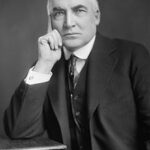Warren G. Harding’s rejection of the League of Nations marked a dramatic shift in American foreign policy. The new president deliberately abandoned Woodrow Wilson’s internationalist vision. America retreated from global leadership just when the world needed stability most. ⚠️
The Harding League of Nations Decision
Harding formally rejected League membership during his first months in office. He declared the organization incompatible with American sovereignty. The president argued that international commitments would entangle America in foreign conflicts. This decision reversed Wilson’s careful diplomatic work during the Paris Peace Conference.
Congressional Support for Isolationism
Republican senators strongly supported Harding’s isolationist stance. They feared League obligations would override American independence. Henry Cabot Lodge led the opposition to international cooperation. 📊 Senate votes consistently favored withdrawal from global commitments throughout 1921.
Public Opinion and Political Pressure
Many Americans embraced isolationism after World War I’s devastation. War weariness dominated public sentiment across the nation. Voters wanted focus on domestic prosperity rather than foreign entanglements. 💰 Economic concerns overshadowed international responsibilities in popular discourse.
Impact:
The rejection created a dangerous power vacuum in international relations. America’s absence weakened the League’s ability to maintain peace. European nations struggled without American economic and diplomatic support. This isolationist approach had profound long-term consequences for global stability.
Immediate International Consequences
European allies felt abandoned by America’s sudden withdrawal from leadership. The League of Nations lacked enforcement power without U.S. participation. 🌍 International crises became harder to resolve through collective action. Germany and other revisionist powers exploited America’s absence from global affairs.
Economic and Diplomatic Isolation
American businesses lost opportunities for international cooperation and trade agreements. Diplomatic relationships with former allies became strained and complicated. The rejection damaged America’s reputation as a reliable international partner. 📉 Global economic recovery slowed without American participation in coordinated efforts.
Long-term Global Instability
The isolationist policy contributed to conditions enabling World War II. Aggressive nations faced less international resistance without American involvement. The League’s failure to prevent conflicts stemmed partly from U.S. absence. 🔥 Historical analysis shows this decision undermined collective security principles that might have prevented future wars.
